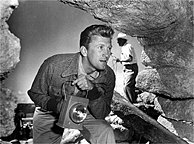Bias By Omission at the AP
In my opinion, bias by omission is the commonest form of bias. This AP article regarding the infamous Duke lacrosse rape allegation story is a classic example.
In this article, we are told that the Durham prosecutor, Mike Nifong, is being silent in the face of a "relentless assault" (how's that for a loaded language?) on his case. Further in the article, the moral high ground is ceded to Nifong because "[i]nstead of speaking out, Nifong has encouraged the public to come to trial to hear his evidence." And to drive home the point, the article quotes a member of the National District Attorneys Association: “The defense attorneys are there to muddy the water. . . . You can’t expect anything they say to be said without viewing it through their own prism. They’re there to obfuscate the facts. They’re not there to educate the public.”
This is a hack job, pure and simple. When the case first came to light, there wasn't a camera Mike Nifong wouldn't jump in front of to talk about the case. He talked at the university that the accuser attended, and he made numerous public statements about the case. Now, we are told that the defense attorneys are conducting a "relentless assault" on his case, and that he wants to try his case in front of jury.
Give me a break. The reality is that Nifong started out by trying this case in public (something which coincided with an uncoming primary election), and now the AP is there to carry his water by implying that the defense attorneys are "muddying the waters" and that he is being silent. But you'd never know that from the AP article. Though I am not a journalist, I feel safe in saying that this cannot be in accord with good journalistic practices.
And, while I am at it, why didn't the AP reporter putting together this slanted piece bother to ask Mr. Early [the quoted member of the National District Attorneys Association] if publicizing statements of police officers and nurses who examined the alleged victim is "muddying the waters"? Why didn't the AP reporter ask Mr. Early to comment on Nifong's behavior at the beginning of the trial?
One wonders if the particulars of this alleged crime influenced the write-up here. I cannot imagine that it did not, as journalists usually don't point out the motives of defense attorneys or carry water for prosecutors.
(posted by new Mediacrity contributor)
------------------
To read the most recent items in this blog, click here!
To donate to Mediacrity, click here!
In this article, we are told that the Durham prosecutor, Mike Nifong, is being silent in the face of a "relentless assault" (how's that for a loaded language?) on his case. Further in the article, the moral high ground is ceded to Nifong because "[i]nstead of speaking out, Nifong has encouraged the public to come to trial to hear his evidence." And to drive home the point, the article quotes a member of the National District Attorneys Association: “The defense attorneys are there to muddy the water. . . . You can’t expect anything they say to be said without viewing it through their own prism. They’re there to obfuscate the facts. They’re not there to educate the public.”
This is a hack job, pure and simple. When the case first came to light, there wasn't a camera Mike Nifong wouldn't jump in front of to talk about the case. He talked at the university that the accuser attended, and he made numerous public statements about the case. Now, we are told that the defense attorneys are conducting a "relentless assault" on his case, and that he wants to try his case in front of jury.
Give me a break. The reality is that Nifong started out by trying this case in public (something which coincided with an uncoming primary election), and now the AP is there to carry his water by implying that the defense attorneys are "muddying the waters" and that he is being silent. But you'd never know that from the AP article. Though I am not a journalist, I feel safe in saying that this cannot be in accord with good journalistic practices.
And, while I am at it, why didn't the AP reporter putting together this slanted piece bother to ask Mr. Early [the quoted member of the National District Attorneys Association] if publicizing statements of police officers and nurses who examined the alleged victim is "muddying the waters"? Why didn't the AP reporter ask Mr. Early to comment on Nifong's behavior at the beginning of the trial?
One wonders if the particulars of this alleged crime influenced the write-up here. I cannot imagine that it did not, as journalists usually don't point out the motives of defense attorneys or carry water for prosecutors.
(posted by new Mediacrity contributor)
------------------
To read the most recent items in this blog, click here!
To donate to Mediacrity, click here!


<< Home